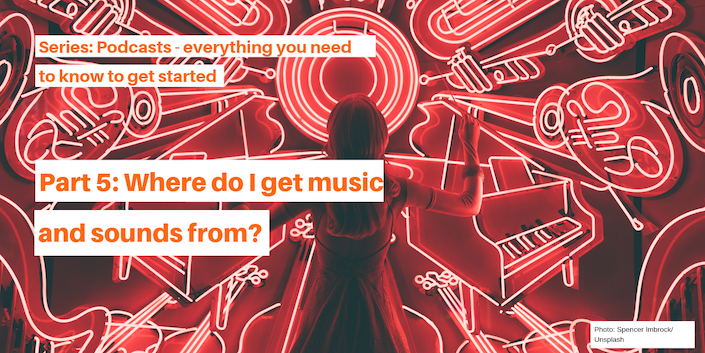In the series "Podcasts - everything you need to know to get started" we take a closer look at different aspects of podcasting. Part 5 clarifies what you need to consider if you want to use music in your podcast.

Many podcasters would like to use music in their podcasts, but are deterred by licensing and the jungle of different rights. Here’s what you need to know about using music in podcasts.
We have a fresh, updated 10-step guide to help you start your podcast from scratch. Get started today with expert tips and recommendations to ensure your podcasting success.
Click here to begin!
Other parts of the “Podcasts - everything you need to know to get started” series
Most podcasts have a short intro and outro, a piece of music or sounds at the beginning and end of a series that are easily recognizable. And depending on the production, additional sounds and music are used in the podcast. But where do you get them and what do you have to pay attention to?
There are many different providers who offer music for use in media productions such as podcasts free of charge and for a fee.
Free music providers
The biggest advantage of free music providers obviously is that they are free. Artists usually offer their music under Creative Commons licenses (with some conditions, e.g. naming) or even in the public domain (without any conditions of use). However, since these platforms generate little or no revenue from music, they usually do not clarify the rights for each piece of music. The danger that you use a song from such platforms in good faith, when actually you are not allowed to use it, tends to be greater than with charging music providers. So you have to trust or verify that you can really use the music for free.
Examples of free providers:
Fee-based music providers
The fee-based providers can be subdivided into two subcategories, namely the so-called collecting society-free music and the music from the collecting society repertoire.
To understand this, it is worthwhile to understand the logic behind it. For the use of music in podcasts, two rights are particularly relevant: the dubbing right and the reproduction right. The dubbing right means that you can use a piece of music in another media product such as a podcast or film, e.g. you can add it to the podcast (dubbed) almost once in your editing program. It usually has to be purchased from the music label. The reproduction right allows you to make the podcast and the music it contains available to listeners, e.g. to offer it for download. This right may have to be acquired from the collecting society. The society then distributes its income (royalties) to the artists.
The advantage of fee-based providers over free archives is that you can be sure that the rights have been clarified and that the music can actually be used. But the use costs money.
Royalty free music
Fee-based services that offer so-called royalty - free music cooperate with artists who are not represented by the collecting society. An artist can only register his entire repertoire with the collecting society and not license individual titles differently.
For providers of “royalty-free” music, this means that they can release titles from their catalogue for use in podcasts with a single payment. Depending on the provider, the quality of the music and the type of use, licensing a title for a podcast typically costs a one-time fee of between 10 - 100 € / 11 - 112 $ and is generally valid indefinitely. Some providers also offer subscriptions with which an unlimited number music pieces from their catalogue can be used.
Examples of charging providers, “collecting society - free” music:
Music composed for your project
Choosing one of the presented offers you are obviously using music “off the rack”, even if the pieces of music are perhaps not so frequently used. If you want to have something very individual, you can of course also have the music composed and produced. In this case, you must also note that you are subject to licensing by the collecting society if the composer is represented by the collecting society.
Non - musical sounds / Sound effects
Also for non-musical sounds and sound effects, e.g. dog barking or the soundscape of a certain station, there are free and chargeable providers. However, the collecting society does not play a role here.
Examples of providers are:
Next: How do I create a podcast cover? (16. August)
Note: In this chapter we have tried to make the field of music usage understandable for you. However, this topic is quite complex and there are big differences between the providers. Of course we do not replace legal advice and you should read the conditions carefully. You can also contact both the music providers and the collecting society.
Podigee is the best all-in-one podcast package on the market. We offer you everything you need to successfully distribute your podcast on all podcast platforms. Plus, you get fantastic customer service and the best podcast analytics in the industry. Try Podigee 14 days for free: https://www.podigee.com/en/pricing/